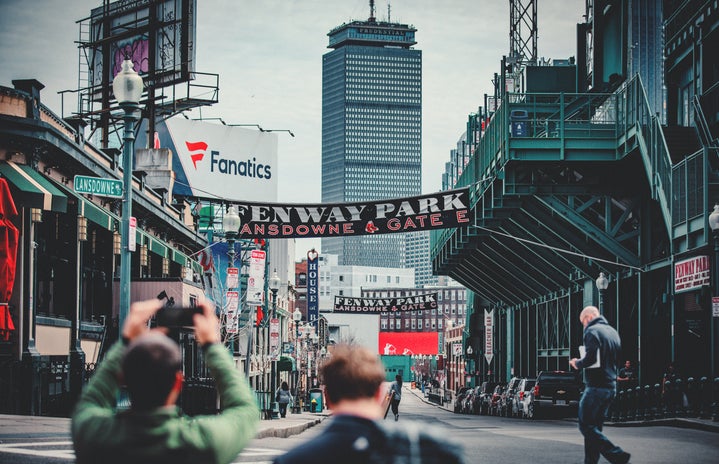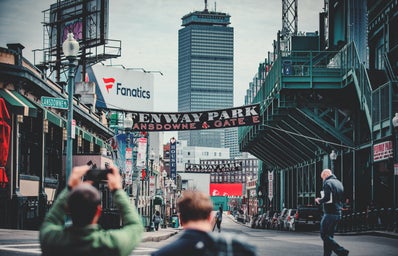In case you haven’t noticed, Boston has been under A LOT of snow lately: 104.1 inches this entire season, to be exact. To put it in perspective, Boston had more snow in just 10 days than it normally sees the entire winter, according to the National Weather Service. Bostonians are now experiencing their second snowiest winter on record, just a few inches short of the winter of 1995-1996, which brought 107.6 inches. And with three weeks left of winter, it is very likely this season will bring the most snow Boston has seen in history.
These record-breaking snowfalls have brought out strong emotions in all of us, especially the MBTA, which has been under much-needed scrutiny for their unequipped subway system. Car owners in South Boston have also been forced to deal with the sometimes-illegal, sometimes fight-provoking practice of “space saving,” which maintains that if you took the time to shovel out a parking spot, you are entitled to that spot (as long as you claim it with a plastic lawn chair). And naturally, Boston students rejoiced in enough snow days to declare a spring break in February.
Although Boston has been hit the hardest in the recent string of snowstorms, it has not been the only Northeast city with major storms. Snow accumulations have broken records in Bangor, ME and winter storm Juno is now amongst the top five snowstorms to ever hit Providence, RI and Portland, ME.
So, what is up with all the snow? Is climate change to blame? The answer: probably.
Recent weather patterns seem to be aligned with climate change predictions. Kevin Trenberth, a senior scientist at the National Center for Atmospheric Research explained to The Huffington Post that as ocean temperatures get warmer, the air over the ocean will begin to hold more moisture. Big storm events commonly form when cold land air collides with the warmer, high-moisture air found offshore.
“In mid-winter, it is expected with climate change that snowfalls will increase as long as the temperatures are cold enough,” said Trenberth. “The atmosphere can hold 4 percent more moisture for every 1℉ increase in temperature. So as long as it does not warm above freezing, the result is a greater dump of snow.”
Michael Oppenheimer, a professor of Geosciences at Princeton University explained to Frontline that winters will also get shorter as a result of climate change. However, if there is enough moisture in the air during the season, people should expect “wicked big snowstorms.”
Another reason why the Northeast has received the biggest hit this winter could be because of something far more complex than the amount of moisture in the air. Some scientists believe the unusual wavering of the polar jet stream is also a culprit in Boston’s Snowpocalypse.
Jet streams are bands of strong air currents that circle the Earth. They meander throughout the year, and are responsible for bringing cold, strong air currents to the Northeast during winter months. Last year, the polar jet stream shifted to a lower latitude, triggering the Polar Vortex.
Normally, the polar jet stream crashes with a wall of cold air in the Arctic, heads south towards the US, and deviates into the Atlantic Ocean. But this year, instead of deviating to the ocean, the jet stream shifted upward to the Northeast. The cold air from the jet stream, combined with the high-moisture air found on the northern Atlantic coast, hammered the Northeast with an unprecedented amount of snow.
The polar jet stream’s unusual position may be linked to climate change. A study published in the December issue of Environmental Research Letters, states that “The Arctic has warmed at approximately twice the rate of the Northern mid-latitudes since the 1990’s.” According to the authors, Jennifer Francis and Stephen Vavrus, “The disproportionate temperature rise is expected to influence the large-scale circulation, perhaps with far-reaching effects.”
It is both evident and without dispute that climate change influences weather patterns. However, there is still uncertainty when it comes to proving the specific reasons why the shifts in weather are occurring and whether they can be directly attributed to climate change.
“I don’t know if this particular set of weather events is attributed to climate change,“ said Evan Kodra, a Northeastern University PhD graduate, who focused on extreme climate events. “I wish it was that straightforward.”
Kodra explained that although scientists know climate change will cause extreme weather events, it is hard to say which specific events are caused by climate change and which ones occur because of natural variability. He compared making this distinction to baseball players who use steroids. Everyone knows that a baseball player who uses steroids will hit more home runs. However, it is impossible to identify which specific home runs were caused by the steroids.
Kodra’s research has shown that climate change will redistribute where it rains and snows in regards to space and time. One of the projected scenarios is the persistence of extreme snow events, like the ones the Northeast is experiencing now. We may not know exactly how climate change will affect the weather, but we do know it will be significant.
“The bottom line is in the future we’ll have a shorter snow season overall but more very intense storms,” Oppenheimer said in Frontline, “Has this already started? Probably so.”
Sources
http://www.weather.com/storms/winter/news/winter-storm-juno-historic-blizzard
http://www.huffingtonpost.com/2015/01/26/climate-change-northeast-snow_n_6549996.html
http://www.livescience.com/13669-extreme-cold-events-climate-weather-global-warming.html

